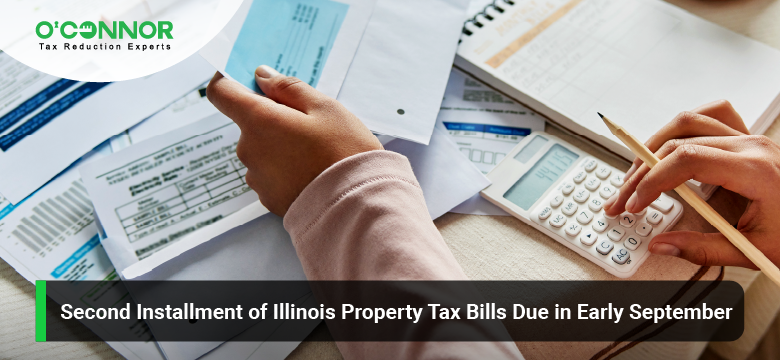
2025 seems to be flying by, as we have just entered August. While summer may be coming to an end, the people of Illinois are seeing their focus drawn back to property taxes. While there was no state reassessment this year, township assessors across Illinois still kept up with their work, and tax bills, outside of Cook County anyway, came out on time. Bills went out on May 1, 2025, and the first installment of payments has come and gone. With one round of payments in the books, the second installment will soon be due.
Paying on time is important for a litany of reasons, most notably saving on late fees and interest. The people of Illinois pay the second-highest property taxes in the United States already, no need to add to them with fees. Illinois is not a monolith, however, and each county has its own due dates for this final payment for the 2024 tax year. It is imperative to keep these dates in mind, as late fees begin the day after the deadline expires.
Illinois Tax Deadlines
We will focus on the collar counties around Cook County, but the rest of Illinois generally keeps to this schedule. If you do not see your county listed, know that a general rule of thumb is that taxes are due in the first week of September. There are outliers to this though, for instance, McHenry County has set the due date all the way to September 10.
| County | Deadline |
|---|---|
| DuPage County | September 2 |
| Kane County | September 2 |
| Kendall County | September 4 |
| Lake County | September 4 |
| Grundy County | September 5 |
| McHenry County | September 10 |
Illinois Late Fees and Tax Sales
There is little room to maneuver once the deadline passes. One day after the deadline, fees begin to be assessed on your late bill. This starts with a 1.5% fee on your taxes in September. In October, this goes to 3%. Fees continue to build at 1.5% per month until the delinquent taxes are paid. This can quickly escalate out of hand, which is why it is so important to keep your deadline in mind and pay on time.
Eventually, delinquent taxes can result in a tax sale toward the end of the year. This is where a collector buys your tax account and begins adding even more fees. In this phase, you are actively in the process of property redemption, a spiral that quickly adds even more costs on top of the delinquent taxes. If you cannot pay the steep cost to redeem your property, then eventual foreclosure by the tax buyer will occur, usually after two or three years.
Can Property Taxes be Lowered?

With how high taxes are in Illinois, most property owners are always on the lookout for a way to lower their burdens. Unfortunately, once tax bills have been issued, there is little that can be done to lower the amount owed. Tax rates are handed out by taxing bodies, which cannot be changed. The only two ways available to lower property taxes are with exemptions and with property tax appeals. Both of these must be filed before tax bills are created. While these cannot impact your taxes in 2025, they can be used to get a jumpstart in 2026.
Property Tax Appeal Deadlines Near
You cannot lower your tax rates, as these are handled individually by organizations like school districts. Instead, you can use appeals to lower the assessed value of your property. Since tax rates and the equalization factor are both built on this one base number, lowering it can have many benefits. First, appeals ensure that you are paying what your property is actually worth, not an abstract number that your township assessor pulled from a reem of data. Second, an appeal can show that your property is overvalued compared to a similar one, which should necessitate a cut in your taxable value.
Property tax appeals were once seen as a luxury for wealthy property owners but are quickly becoming the norm now that Illinois property taxes have gone off the rails. Several attempts have been made to address the soaring taxes legislatively, but all have hit a dead end. It is up to the taxpayer to protect their property, as no one else is going to do it. Like taxes, most townships run on their own schedule when it comes to property tax appeal deadlines, with even some in the same county being months apart. It requires diligence to keep all of these cutoff dates straight, and sometimes it is best to have an expert by your side to deal with it all.
A Perfect Time for O’Connor
The 2024 tax bills may be settled, but there is plenty of hope for the future. We at O’Connor love helping our clients fight the system. We have taken on predatory assessors, appraisers, and taxing bodies across 49 states, each having its own set of challenges. Illinois has become one of our biggest battlefields and has triggered a passion in us that few states have managed. With that, we are bringing our full arsenal to bear against high Illinois taxes.
When you join O’Connor, we will protest your taxes every year. That way, you do not have to worry about your bills getting out of control. Each year, we will take your taxable value to the highest authority necessary to get you a reduction. Usually, that is your local township assessor, but the Board of Review (BOR) is becoming more important every year when it comes to both residential and commercial appeals. If your local assessor or BOR are not enough, then we can even take your taxes all the way to Springfield in a hearing with the Property Tax Appeal Board (PTAB).
We will keep all deadlines in mind, ensuring that your appeal is on time, allowing you to continue with confidence. You will no longer have to worry about being blindsided by large tax bills or being concerned about making one of your annual payments due to high costs. Best of all, you will not pay us a cent unless we can lower your taxes. This means that you have nothing to lose and everything to gain by joining with us to fight your taxes. Our enrollment is always open but now is a great time to strike. Protest deadlines are beginning to close around the collar county area, so it is important not to delay.
About O’Connor
O’Connor is among the largest property tax consulting firms in the United States, providing residential property tax reduction services in Illinois, Texas, and Georgia, as well as commercial property tax reduction services across the United States. O’Connor’s team of professionals possess the resources and market expertise in the areas of property tax, cost segregation, commercial and residential real estate appraisals. The firm was founded in 1974 and employs a team of more than 1,000 worldwide. O’Connor’s core focus is enriching the lives of property owners through cost effective tax reduction.
Property owners interested in assistance appealing their assessment can enroll in O’Connor’s Property Tax Protection Program ™. There is no upfront fee, or any fee unless we reduce your property taxes, and easy online enrollment only takes 2 to 3 minutes.

